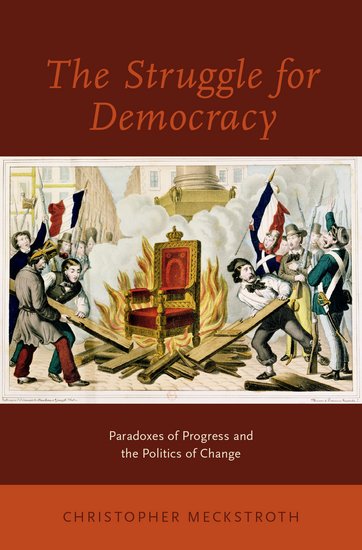Like this article? rabble is reader-supported journalism. Chip in to keep stories like these coming.
Our era of globalization has been characterized by democratic rebellion: the anti-USSR civil society insurgency of 1989, the Zapatista uprising, the World Social Forum, the Arab Spring, the Occupy movement, and current demands for electoral reform all demonstrate in different ways a desire for greater public representation in a new governance process. An insightful recent book, The Struggle for Democracy (Oxford University Press, 2015) by Christopher Meckstroth, a lecturer at Cambridge University, and a former colleague, points out that the various mobilizations of our period are not simply political but also philosophical: the battle is not only to implement a new democracy but also to define what would constitute genuine democratic transformation. What are the elements of a more politically egalitarian society, and who should decide when democratic activists argue rather than agree? What standards do we use to evaluate change when our conceptions of the ideal set of progressive state institutions are always evolving? Our age’s struggles are as much theoretical as they are practical.
Meckstroth contends that we need a theory of democratic change that does not define the process simply in terms of timeless principles and institutions. “Timeless” arguments interpret change as either bringing us closer to a pre-conceived ideal or simply trusting our current system’s laws, norms and practices to reform themselves, on the assumption that they are already reliable enough. We know in hindsight that our political bodies have often only been capable of self-reform because of external pressure from collective mobilizations or war. There would have been no democracy in France, or end to slavery in the USA, without challenges coming from outside the monarchy in the case of the former, or outside the institution of slavery in the case of the latter. The belief that our institutions are intrinsically capable of self-reform has been periodically subverted by emergent historical circumstances.
How do we construct a theory of democratic change that can take account of historical specificity without falling into irrelevance, or that can acknowledge regularity without being trapped by a deceptively eternal claim? One of the philosophical challenges of our time is that one cannot make a positive argument without a critic reasonably contending that the foundation of the theory is specific to one’s circumstances and is therefore not generalizable across contexts either as a law or as historical metanarrative. Such contextualist arguments are often deployed against modern thinkers. One of Meckstroth’s projects is to demonstrate that the German philosopher Hegel, among others, actually deployed a non-foundational mode of argument in order to interpret social change. Hegel’s proposal, according to Meckstroth, is that if we want to define whether our present order is more free than past ones, we should examine whether the current system escapes the contradictions of previous regimes. If it does, then we can assume that we are more emancipated than in earlier times without necessarily assuming that we also know what further emancipation must look like in the future. Thus the “foundation” of the argument does not rely on an immutable essence or a historical choreography which presumes inevitable progress. Instead this philosophical method relies on comparisons with past social orders: is our system more consistently democratic than previous ones? If so, then we can argue that we have advanced, even if we never come to agree on what a “perfect” democracy would look like.
Meckstroth employs this mode of argument to thoughtfully re-examine a number of relevant cases such as the New Deal, gun control and same-sex marriage. In the latter case, Meckstroth notes how same-sex marriage achieved democratic legitimacy in the U.S. by first winning the support of a majority of LGBTQ organizations and then advancing a broader claim through an interplay between the courts and grassroots movements, before ever winning victories in elections. The book argues that when we are trying to assess competing claims, we ought to judge not by an external standard but to ask instead which side has the most defensible claim to represent the decision of the whole citizenry as to the best interpretation of their own equal freedoms. It follows that alternatives to the status quo are defensible when supported by enough of the people who have to live with the proposed changes — although this could be less than a majority when a minority’s equal rights are at stake.
In terms of limitations, the text is perhaps too quickly critical of Hegel’s notion of Sittlichkeit, that is, the philosopher’s understanding that liberty relies on an institutionalized form of ethical life. For example, without a community grounded in the entrenched practices of familial love, individualism and constitutionally grounded national solidarity, it may be impossible to fully recognize the achievements of modern freedom. Or to put it another way: an era of high divorce rates, asocial individualism and national fragmentation will not easily enable struggling democrats to appreciate and build on the fundamental ethical consensus, “the rose in the cross of the present,” that underpins many contemporary activist battles.
The Struggle for Democracy has numerous strengths. One of the most important is that it offers us a framework by which to navigate the tension between the general and the relative when assessing historical change. It offers such a framework without positing either an abstract modern universalism or an abstract postmodern difference as the guiding principle of analysis. The book is a substantial contribution for progressives who are looking for a robust philosophical-historical method for assessing democratic change.
Thomas Ponniah, Ph.D., is an Affiliate of the David Rockefeller Center for Latin American Studies, and the co-editor of Another World is Possible: Popular Alternatives to Globalization at the World Social Forum (Zed Books 2003), and the co-editor of The Revolution in Venezuela: Social and Political Change Under (Harvard University Press 2011).
Like this article? rabble is reader-supported journalism. Chip in to keep stories like these coming.




